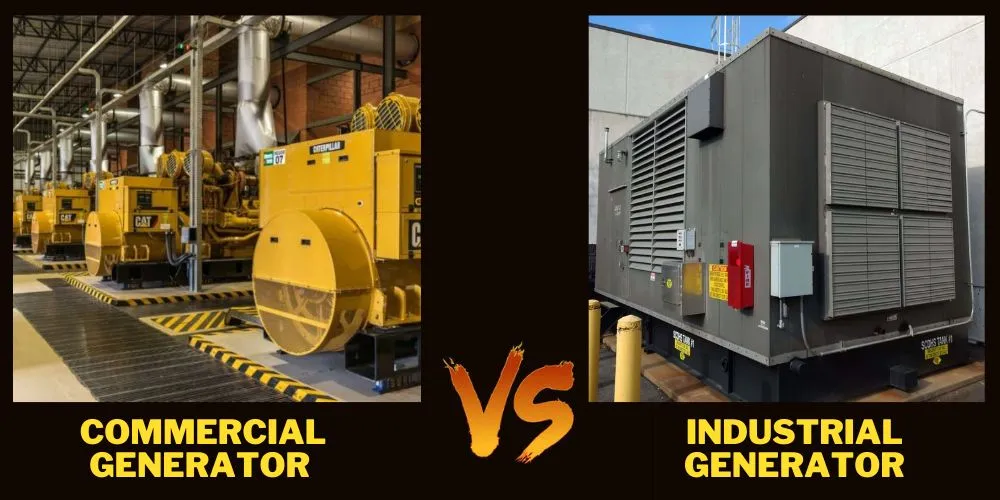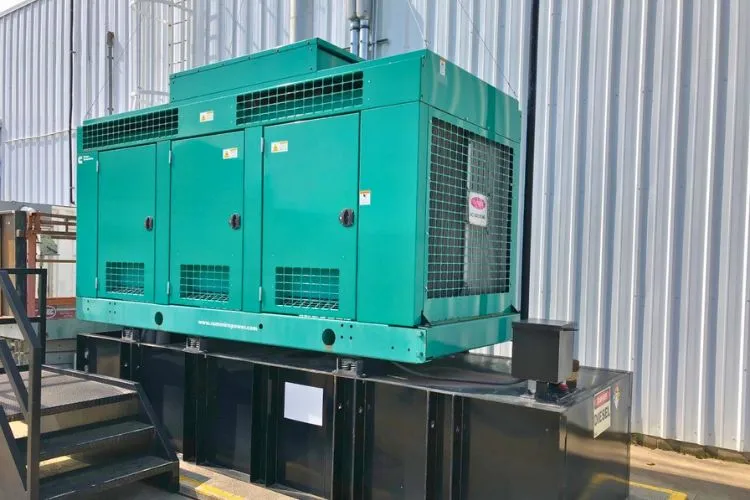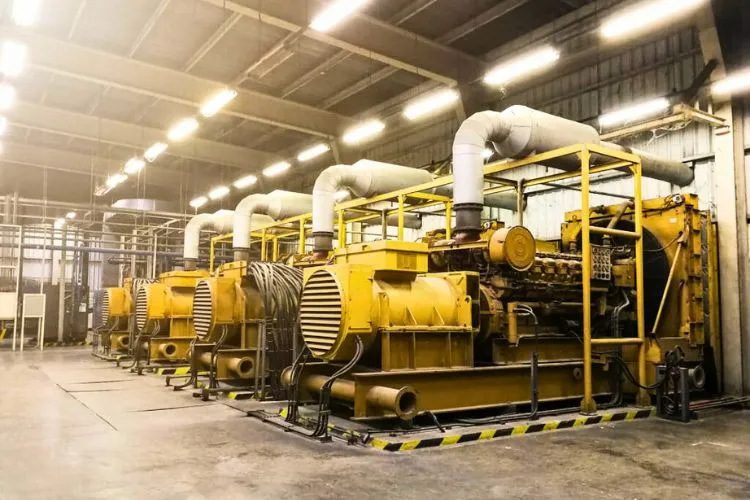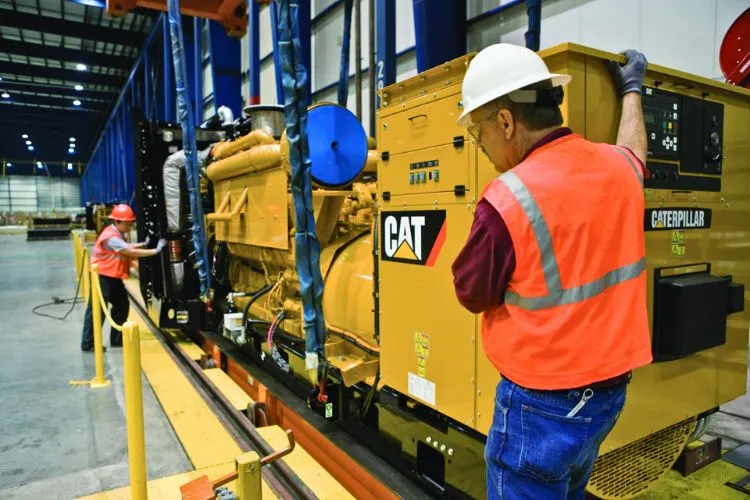When it comes to ensuring the continuous operation of your business or industry during power outages, selecting the right generator is crucial.
Generators are pivotal in not just mitigating the loss of revenue during power cuts but also in keeping critical systems operational, ensuring safety, and minimizing inconvenience.
This article delves into the debate of commercial vs industrial generator, aiming to inform you on the most fitting choice for your specific needs.

Understanding Generators: Basics
Generators serve as backup power sources, converting fuel into electricity to keep the lights on and machines running when the primary power source fails.
Different types of generators are available based on their fuel source, such as diesel, gas, and hybrid models. Each has its own set of advantages and is suitable for varying needs and environments.
Commercial Generators: An Overview

Definition and Key Features
Commercial generators are designed to fulfill the backup power requirements of smaller-scale operations like retail settings, small businesses, and office environments.
These generators are known for being more compact and quieter than their industrial counterparts, making them ideal for businesses located in closer proximity to residential areas or where noise is a concern.
Applications
Common applications of commercial generators include powering essential electronics, lighting, and HVAC systems in businesses to keep them operational during short-term power outages.
They are not designed for the constant, heavy-duty usage found in industrial environments but rather for occasional use.
Advantages
The primary benefits of commercial generators include their suitability for low to medium power capacities, quieter operation, and compact sizes. They offer reliable backup power without the need for a large footprint or significant disturbance due to noise.
Limitations
However, commercial generators have their limitations. They are not intended for prolonged, heavy-duty use and might not offer the durability or power capacity required by larger facilities or industrial operations.
Industrial Generators: An Overview

Definition and Key Features
Industrial generators, meanwhile, are built for heavy-duty applications. They are larger, have a higher power output, and are designed to withstand rigorous use over extended periods.
These generators are used in sectors such as manufacturing, large-scale construction, and other industrial settings where the power demand is high.
Applications
These generators are meant to operate under demanding conditions, providing a steady power supply to large machinery, extensive lighting systems, and high-powered equipment.
Industrial generators are essential for operations where power loss can lead to significant financial losses or safety hazards.
Advantages
The robust build of industrial generators allows them to offer dependable power for extended durations.
Their durability underpins their ability to handle the vigorous demands of industrial environments without faltering, making them an invaluable asset for critical operations.
Limitations
The trade-off for this high level of power and durability is a higher initial investment and operating cost. Industrial generators are also louder and require more space, posing potential issues in noise-sensitive areas.
Commercial Vs Industrial Generator
Power Needs Assessment
Determining your precise power requirements is the first step in selecting a generator. Calculating both your average and peak power demands ensures you choose a generator capable of meeting your needs without under or overestimating the required capacity.
Space and Location
The intended location of the generator influences your choice significantly. Considerations must include the available space and the impact of generator noise on the surrounding area.
Industrial generators, being larger and noisier, may not be suitable for locations close to residential areas.
Fuel Type and Availability
The choice of fuel—diesel, gas, or another source—has implications for the operating costs and logistics of running a generator. The availability of the fuel source, as well as storage options, must be considered to ensure a reliable power backup solution.
Budget
The financial aspect of acquiring a generator encompasses not only the initial purchase cost but also the long-term operating expenses.
It’s vital to evaluate your budgetary constraints in both the short and long term when making your selection.
Maintenance and Safety
Maintaining your generator is pivotal to ensuring its reliability and longevity. Regular checks and servicing should be part of your operational procedures regardless of the generator type.

Safety also cannot be overstated; ensuring proper installation and operation according to manufacturers’ guidelines and local regulations will protect both personnel and assets.
Pro Tips
Future-proofing your investment should be a priority. Consider potential expansions or increases in power demand when selecting a generator size.
Noise-sensitive areas may benefit from sound-attenuated generator models to minimize disruption.
Opting for generators with environmental certifications can also position your business favorably regarding regulatory compliance and operational efficiency.
Installation Best Practices
A professional, experienced installer will not only ensure your generator is set up correctly but also compliant with all relevant regulations and standards. Professional installation is non-negotiable for both safety and functionality.
Frequently Asked Questions (FAQs)
Can a commercial generator be used as a backup for industrial operations?
It’s generally not recommended, as commercial generators may not provide the necessary power or durability for industrial needs.
How does the cost of operation compare between commercial and industrial generators?
Industrial generators tend to have higher initial and operating costs due to their larger size, greater power output, and the heavy-duty nature of their applications.
Are there environmental considerations when choosing between commercial and industrial generators?
Yes, selecting models with better fuel efficiency and lower emissions can help mitigate environmental impact, with some models offering more advantages in this regard.
ntages in this regard.
How often should commercial and industrial generators be serviced?
Servicing frequency depends on usage but typically ranges from semi-annually to annually, with more rigorous usage scenarios requiring more frequent checks.
Can I upgrade my commercial generator to an industrial one if my business needs grow?
While upgrading is possible, it involves significant cost and logistical considerations. Planning for future needs at the initial purchase can help avoid this scenario.
Conclusion:
Choosing between a commercial and industrial generator is a decision that impacts the resilience, efficiency, and operational continuity of your business during power outages.
By carefully considering your specific needs, space limitations, budget, and future requirements, you can select a generator that offers both reliability and value.
Consulting with experts and prioritizing professional installation and maintenance will further ensure that your power backup system supports your operations seamlessly and efficiently.
Making an informed choice between commercial and industrial generators sets the foundation for uninterrupted business operations, safeguarding against potential losses and safety hazards associated with power outages.
Choose wisely to keep your operations running smoothly, regardless of external power challenges.
